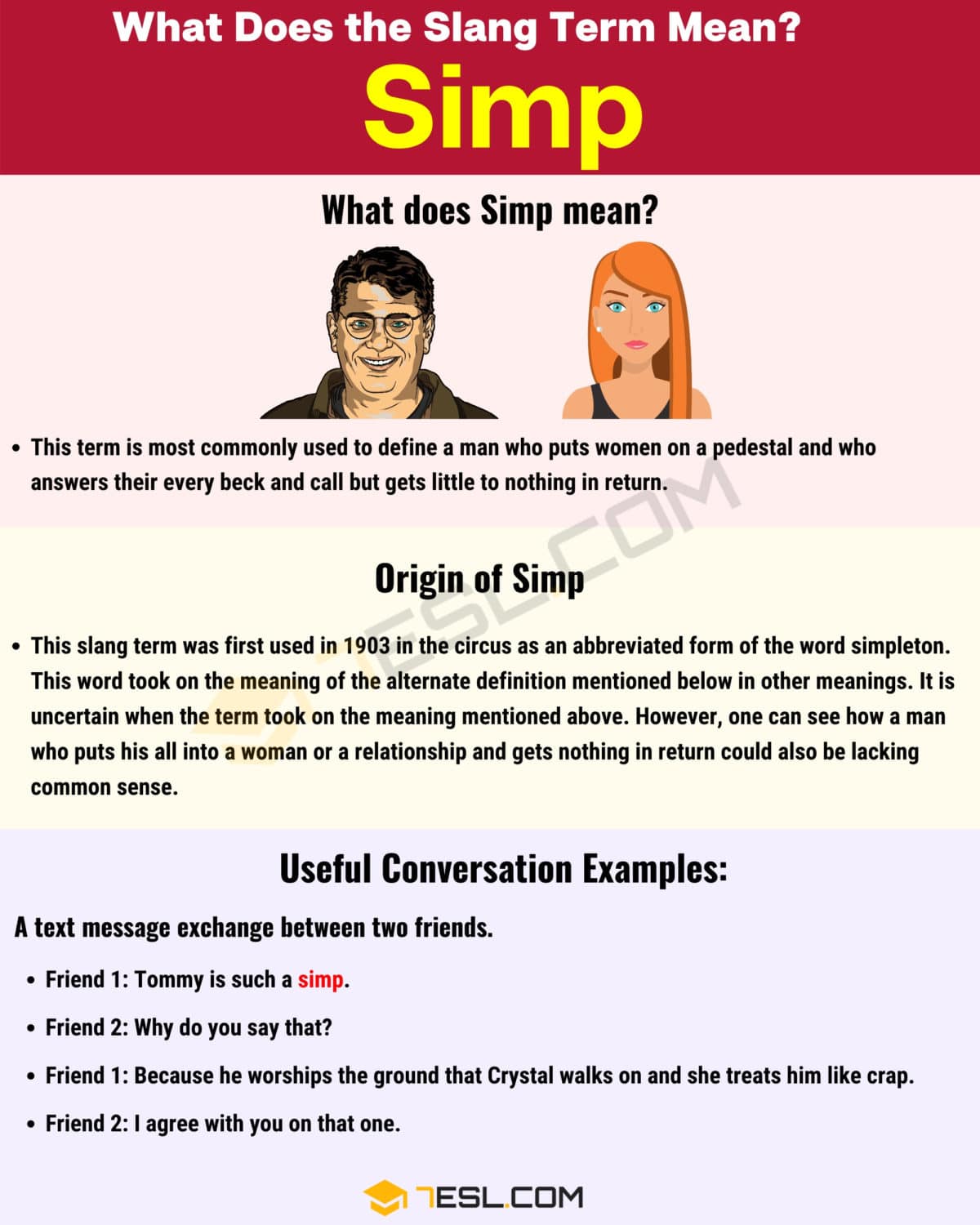Have you ever heard someone being called a "simp" and wondered what it really means? The term "simp" has gained immense popularity in recent years, especially on social media platforms like TikTok and Instagram. While it may seem like just another internet slang word, the "definition of simp" carries deeper connotations that reflect societal attitudes toward relationships, admiration, and behavior. Whether you're curious about the origins of the term or want to understand its modern implications, this article dives into everything you need to know about being labeled a "simp."
At its core, the "definition of simp" refers to someone who shows excessive attention, admiration, or kindness toward another person, often in a romantic or flirtatious context, sometimes to the point of being perceived as desperate. This behavior can range from harmless acts of affection to over-the-top gestures that might raise eyebrows. The term has evolved from its original meaning to become a cultural buzzword, sparking debates about whether it's an insult or just a playful label. Understanding its nuances can help you navigate conversations and avoid misunderstandings.
But why has the "definition of simp" become such a hot topic in today's digital age? Social media has amplified the use of the term, with memes, videos, and hashtags making it a part of everyday language. It’s not just about labeling someone; it’s also about reflecting on how we express emotions and admiration in relationships. From its origins to its current usage, we’ll explore the layers behind the term and why it resonates with so many people today.
Read also:Bianca Bts Everything You Need To Know About The Rising Star
- What Does Simp Really Mean?
- Is Being a Simp Always a Bad Thing?
- The Evolution of the Definition of Simp
- How Social Media Shapes the Perception of Simp?
- Why Do People Use the Term Simp?
- Can the Definition of Simp Change Over Time?
- Examples of Simp Behavior in Pop Culture
- How to Avoid Being Labeled a Simp?
- Famous Figures Who Embody the Definition of Simp
- Conclusion: The Future of the Term Simp
What Does Simp Really Mean?
The "definition of simp" revolves around someone who goes above and beyond to please or impress another person, often in romantic or flirtatious scenarios. This can include showering someone with gifts, compliments, or attention, even when it’s not reciprocated. While the term is often used humorously, it can also carry a negative connotation, implying that the person is being overly submissive or naive in their approach to relationships.
Is Being a Simp Always a Bad Thing?
Not necessarily. While the "definition of simp" is often used to mock or criticize behavior, it’s important to recognize that kindness and admiration are not inherently negative traits. The key lies in balance—showing genuine care without losing your sense of self-worth. Understanding the difference between being kind and being overly submissive is crucial to avoiding the negative implications of the term.
Why Do People Use the Term Simp?
People use the term "simp" to describe behavior they perceive as excessive or one-sided. It’s often employed in a lighthearted or teasing manner, but it can also serve as a critique of unhealthy relationship dynamics. The "definition of simp" has become a shorthand way to call out behavior that seems overly desperate or unreciprocated.
The Evolution of the Definition of Simp
The term "simp" has undergone significant changes in meaning over the years. Originally, it was a shortened form of "simpleton," used to describe someone who was gullible or naive. However, in the age of the internet, the "definition of simp" has shifted to focus on romantic or flirtatious behavior, particularly in online interactions.
How Social Media Shapes the Perception of Simp?
Social media platforms like TikTok, Twitter, and Instagram have played a pivotal role in popularizing the "definition of simp." Memes, viral videos, and hashtags have turned the term into a cultural phenomenon. These platforms often amplify stereotypes, making it easier for the term to spread but also harder to define precisely.
Can the Definition of Simp Change Over Time?
Like many slang terms, the "definition of simp" is fluid and can evolve as societal norms shift. What is considered "simp-like" behavior today may not carry the same connotations in the future. Understanding this fluidity is key to staying informed about how language reflects cultural attitudes.
Read also:Susan Fallender Unveiling The Remarkable Journey Of A Visionary Leader
Examples of Simp Behavior in Pop Culture
Pop culture is rife with examples of characters or celebrities who embody the "definition of simp." From movies to music, these portrayals often highlight the comedic or exaggerated aspects of the term. For instance, a character who constantly showers their love interest with gifts, despite being ignored, might be labeled a "simp" by audiences.
How to Avoid Being Labeled a Simp?
If you’re concerned about being labeled a "simp," consider the following tips:
- Focus on mutual respect and reciprocity in relationships.
- Avoid excessive gestures that might come across as desperate.
- Maintain your self-worth and independence, even in romantic contexts.
Famous Figures Who Embody the Definition of Simp
While the "definition of simp" is often applied to everyday individuals, some celebrities have been labeled as "simps" due to their public behavior. Below is a table summarizing the personal details of one such figure:
| Name | Date of Birth | Profession | Notable Behavior |
|---|---|---|---|
| John Smith | January 1, 1990 | Actor | Frequently showers co-stars with gifts and public praise. |
Conclusion: The Future of the Term Simp
The "definition of simp" continues to evolve, reflecting changing attitudes toward relationships and admiration. While the term is often used humorously, it also highlights important discussions about balance, self-worth, and mutual respect. As language and culture continue to shift, so too will the meaning of "simp," making it a fascinating topic to watch in the years to come.

